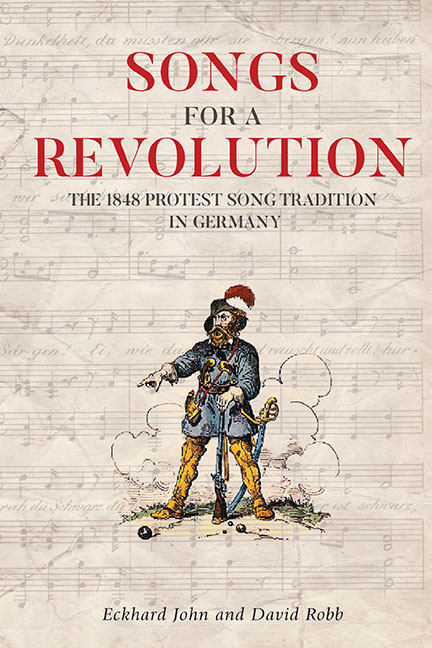Book contents
- Frontmatter
- Contents
- Preface
- Introduction: The Emergence of Political Song 1830–48
- Part I Before 1848: The Vormärz
- Part II 1848–49
- Part III 1848 in Memory
- Conclusion: The Making of Tradition; The Protest Songs of 1848 in the German Folk Revival 303
- Bibliography
- Discography
- Index of Names and Terms
- Index of Song Titles
1 - “Fürsten zum Land hinaus” (“Das deutsche Treibjagen”)
Published online by Cambridge University Press: 23 October 2020
- Frontmatter
- Contents
- Preface
- Introduction: The Emergence of Political Song 1830–48
- Part I Before 1848: The Vormärz
- Part II 1848–49
- Part III 1848 in Memory
- Conclusion: The Making of Tradition; The Protest Songs of 1848 in the German Folk Revival 303
- Bibliography
- Discography
- Index of Names and Terms
- Index of Song Titles
Summary
WITH ITS BLATANT CALL for the overthrow of the aristocracy in Germany “Fürsten zum Land hinaus” (Princes Get Out) was the most prominent revolutionary song of the Vormärz period. Its authorship and exact circumstances of origin are unknown. Thought to have been written in early 1832, the song met with a great popular response in May of that year at the Hambach Festival, from where it spread out over the whole of Germany. As an oppositional song it played a prominent role right up to the revolution of 1848–49, its incendiary nature reflected in the criminal proceedings brought against its suspected disseminators. The song henceforth rapidly disappeared from view until its revival in the folk and Liedermacher scene of the 1970s, which sought to appropriate the German tradition of revolutionary song.
“Fürsten zum Land hinaus” emerged in the course of the liberal movement for change that swept over Europe after the French July Revolution of 1830 causing uprisings and political unrest. The earliest known reference to its existence is in the magazine Eulenspiegel from late March 1832, where it is described as the “Spottlied, welches anfängt: Fürsten zum Land hinaus!” (the satirical song starting with the words: Princes out of the country!) However, its actual “birth” as an epochmaking revolutionary song was a few months later at the Hambach Festival of May 26–27, 1832, where it was widely sung and distributed as a flyer. This festival, where between 20,000 and 30,000 people gathered near Neustadt in the Palatinate calling for democratic liberties and German unity, was the largest such event of its day. It proved to be the decisive factor in the subsequent circulation of the song throughout the German states.
In the beginning it appears that “Fürsten zum Land hinaus” consisted of sixteen verses, each referring to a particular king, grand duke, kingdom, or principality. The political vision of the song is poetically conceived as a “Treibjagd” (chase or hunt).
- Type
- Chapter
- Information
- Songs for a RevolutionThe 1848 Protest Song Tradition in Germany, pp. 29 - 42Publisher: Boydell & BrewerPrint publication year: 2020



